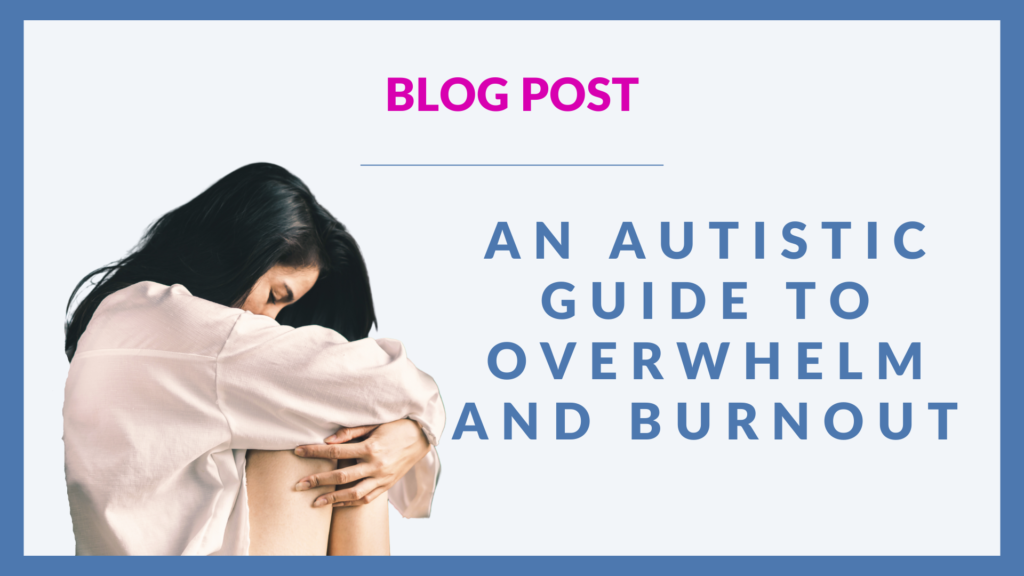An autistic guide to overwhelm and burnout

November 28, 2021 Emma Shergold AN AUTISTIC GUIDE TO OVERWHELM AND BURNOUT Reviwed and updated: October 15, 2025 Five days after I received my autism diagnosis I was exhausted. I was still delighted by the diagnosis, but as the days went on, I became more and more tired. I was no a stranger to this feeling and I knew what I needed to do to improve my energy levels, but it really sucked that I felt this way because of something amazing. In fact, after any one of these occasions: A very sad occasion, such as a family funeral A very happy occasion, such as a family wedding A fun day out for my birthday; or Receiving a diagnosis that allowed 42 years of stress, anxiety and tension to leave my body I feel exhausted a few days later while my body catches up with and processes all the emotions. With autistic exhaustion, it is overthinking and an overload of emotions and/or activities that contributes to the overwhelm that can eventually lead to complete autistic burnout if not addressed. When I was previously told I had depression and anxiety (a mental health disorder), it was the same overthinking that caused the anxiety attacks and eventually bouts of depression. I was advised that best way to address this was to practice a different way of thinking (CBT) and to remain active. However, these processes and activities just made things worse for me. The more I tried to think about things differently and try not to stop completely, the more I was inadvertently compounding my then undiagnosed autism. Whilst anxiety is something that remains with me, I now recognise it is a symptom of being autistic, especially in certain situations. Being autistic is a way of being rather than a disorder, so cannot be treated or made better. And nor do I want to be made ‘better’ or be any other way. I love the way I see the world and find joy in the most simple things. I would never want to change that, but occasionally I do need to manage it to survive. What an autism diagnosis means for me Although my official autism diagnosis was very new, I had been self-diagnosed for about 6 months and been considering it on and off for the previous three years. In that time, I had done a LOT of research on autism in adults and, in particular, how it presents in women (mainly because I am an adult woman). This research enabled me to understand myself better and start making small changes to my lifestyle to better suit my needs. One of these changes was to start understanding the difference between autistic burnout and a mental health breakdown. The latter I thought I had been experiencing (and was being treated for) and the former was actually what had happened. My autistic burnouts had been caused by an accumulation of exhaustion and overwhelm that I had been trying to push through. And in some ways I am relieved that it is ‘just’ overwhelm because I now know how best to manage this. How I manage overwhelm to help avoid burnout Effectively, I have to do the opposite of what I had been told to do for a mental health disorder. A disorder that can be treated, made better and, often, overcome entirely. When I am overwhelmed and/or exhausted, I have to stop completely and allow my body time to recover from whatever has happened. And the sooner I can recognise this and put measures in place, the quicker I can recover and, most importantly, avoid spiralling towards a complete burnout again. You could think of this overwhelm as a mini burnout that ‘only’ lasts for a few days to a week, rather than months or even years. What was once decribed as ‘coping strategies’, I now prefer to call ‘regulation techniques’ – I mean, I am (thankfully) no longer trying to cope with life, I am getting my life back and managing the things that happen along the way. In any case, my process is the same: Remove anything that is not absolutely necessary from my day For me, this is any social commitments, which are extremely minimal anyway and only with people who know I may cancel at the last minute I will reduce my level of exercise, if I even have the energy to do any at all As I am self employed, I class work as necessary, but I will cancel or reschedule this if I really don’t think I can manage it I do usually shower every day, but this might be the only thing I do that day I rarely get dressed into regular clothes unless I have to go out, so pyjamas or lounge pants are standard, but more so during a state of overwhelm or exhaustion. Be strict with my bedtime I make sure I start getting ready for bed at 8.30pm This is what I like to do anyway, but the better I start feeling, the later my bedtime gets Allowing my bedtime to slip is probably how the overwhelm starts building, so is something I incorporate into my management plan. Prioritise things that make me feel good (in this order) For me, not getting at least 9 hours of sleep every night negatively affects every other part of my life, so this is my number one priority in any period of burnout or overwhelm I also love my food. And by that I literally mean MY food. I eat the same foods most days and weeks because I know what I like, I enjoy eating it, and it makes shopping very easy My diet is also relatively healthy and accommodates my dietary needs so it helps nourish me, which is what helps me feel good I avoid social media. I am very selective over what platforms I use anyway, but in any form of burnout or overwhelm, I don’t need to see how
